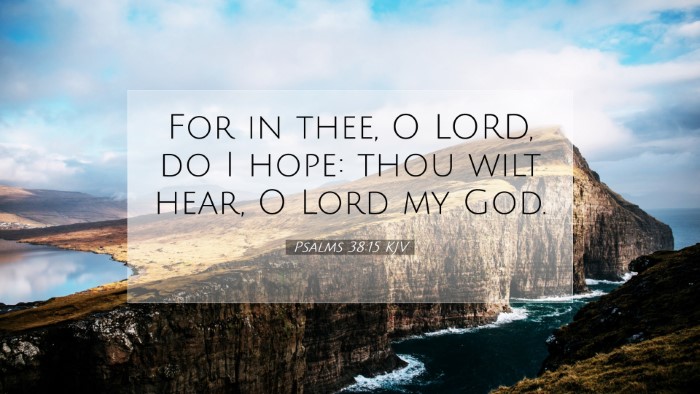Psalms 38:15 - Commentary
Verse Overview:
Psalms 38:15 states, “For I hope in Thee, O Lord: Thou wilt hear, O Lord my God.” This verse encapsulates the psalmist’s deep reliance on God amidst suffering, showing a profound act of faith and trust in divine intervention.
Contextual Background
The Book of Psalms, a collection of sacred hymns and prayers, reflects various aspects of the human experience, particularly in relation to God. Psalm 38 is classified as a penitential psalm, where the writer expresses sorrow for sin and seeks divine mercy. The psalm metaphorically embodies a prayer of a suffering soul seeking restoration and healing.
Critical Insights from Commentators
Matthew Henry's Commentary
Matthew Henry highlights the themes of suffering and repentance throughout this psalm. He emphasizes that the psalmist's constant appeal to God reflects an understanding of God's unchanging nature—He is always ready to listen and respond to His people.
Henry notes that the phrase “For I hope in Thee” signifies a personal trust and expectation from God. The psalmist acknowledges his weaknesses and afflictions but chooses to lay his burdens before the Lord with anticipation of receiving divine consolation.
Albert Barnes' Commentary
Albert Barnes reinforces the notion of hope as a vital theme in this verse. He describes hope as more than a mere wish—it is an earnest and confident expectation based on faith. According to Barnes, such hope is rooted not in one’s own righteousness but in God’s grace and mercy.
Barnes further explains the phrase “Thou wilt hear” as a declaration of faith. The psalmist does not doubt God’s ability or willingness to answer prayers, suggesting an assurance derived from the promises of Scripture. Thus, the psalmist's confidence serves as a model for believers in all generations, particularly in times of distress.
Adam Clarke's Commentary
Adam Clarke provides a thorough analysis of the internal conflict within the psalmist. He points out that while the psalmist is enveloped in distress, the recurring affirmation of hope indicates resilience amidst despair. Clarke interprets “hope in Thee, O Lord” as an act of faith that acknowledges human frailty while gazing steadfastly upon divine sovereignty.
Clarke also draws attention to the assurance expressed in “Thou wilt hear.” He reflects on the nature of prayer, which Clarke asserts must be accompanied by faith to expect answers. This reinforces the essential relationship between trust in God and the anticipation of His response, highlighting the necessity of a personal connection with the divine.
Theological Implications
The verse serves as a theological anchor for believers, reminding them of the nature of God as a receptive figure in times of trouble. Hope in the Lord becomes a recurring theme in Scripture that encourages faith in God's character and His promises. In light of this verse, one can discuss several important theological implications:
- The Nature of Prayer: The assurance of being heard by God reassures practitioners of faith about the importance of earnest prayer in their spiritual lives.
- Human Dependence on Divine Grace: The psalmist’s acknowledgment of hopelessness without God underlines human limitations and reliance on divine mercy.
- Faith in Adversity: The act of hoping in the Lord amidst trials is a testament to enduring faith, encouraging believers to lean into their faith during hardships.
- God’s Unchanging Character: A consistent theme throughout the psalm emphasizes that God remains the same—merciful and responsive, even when the human condition fluctuates.
Applications for Today’s Believers
This verse and its surrounding context invite modern believers—be they pastors, theologians, or students—to explore various applications:
- Encouragement in Trials: Believers can find comfort in the knowledge that their prayers do not go unheard; it encourages perseverance in faith even when circumstances feel overwhelming.
- Emphasis on Hope: The importance of cultivating hope in God; digitizing faith can encourage communities to maintain trust through collective worship and personal practice.
- Response to Suffering: Understanding that suffering can lead to deeper dependence on God and a renewed perspective on His grace.
- Importance of Confession: Emphasizing personal confession and acknowledgment of sin as a pathway to restored relationship with God.
Conclusion
Psalms 38:15 stands as a profound reminder of the essence of hope intertwined with faith. Commentaries by Matthew Henry, Albert Barnes, and Adam Clarke unveil layers of meaning that resonate across generations. As believers navigate the complexities of life, their collective insights reinforce the significance of trusting God in all circumstances. Hope in the Lord exemplifies the epitome of faith—an unwavering belief that transcends temporal challenges and embraces the promise of divine response and restoration.


